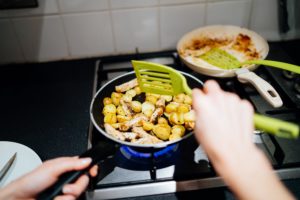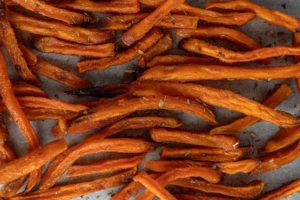I’ll be the first to say it: there are many, many conflicting views around carb consumption. Some common questions always arise even when doing a simple Google search, such as: “Should we avoid carbs and go full keto? Should we eat plenty of carbs and less fat? Should we only eat certain types of carbs?” etc …
Even if you’re not a complete beginner, the scope of information around carbs can be a little overwhelming. Here I’ll break down my method of carb consumption (and no, I don’t shun all carbs!) and how it benefits my training. While not every system works for everyone, this “way” of choosing carbs and when you eat them has resulted in huge successes for many athletes across the board.
Why Give Carbs So Much Attention?

The reason carbs receive so much press is due to their intricate role in weight loss, energy, and water weight. To begin, carbs hold more water molecules, so when you cut them, you also flush excess water from your system, which results in water weight loss. This is why fighters and other athletes may severely limit carbs before a weigh-in or physique competition.
Secondly, carbs, being a form of sugar, can also spike your insulin levels. This can be a great thing once in a while, helping to fuel muscle growth and initiate other beneficial processes; however, if you’re constantly spiking your blood sugar and stimulating insulin release, you can “burn out” your body’s response to insulin, setting the stage for diabetes. When your cells become resistant to insulin in this process, your body begins rapidly storing excess sugar in your bloodstream as fat rather than burning it off. This is why diabetes and obesity are commonly linked.
If you’re familiar with keto and low carb diets, the theory is that by not flooding the body and bloodstream with carbs (sugar), you can avoid storing carbs as fat and avoid spiking your insulin levels. This causes you to remain lean, while forcing your body to switch to burning pure fat.
As you can imagine, this bodes extremely well for weight loss, and is one of the reasons I keep my carbs minimal – often going keto.
(A little side note p.s.: studies show reducing carbs can also significantly reduce your appetite, so you’re not tempted to snack on extra calories that can stall weight loss. [*]
Carbs: When to Eat Then and When to Cut Them

The common question after learning how carbs can negatively affect your body is, “Should I totally stop eating carbs?”
The answer is a little more complex. For all of the negatives around insulin levels and weight gain when it comes to carbs, there are also a lot of positives. Like I mentioned earlier, they can help build muscle, and can even help boost immunity. Not to mention, many extremely nutrient-rich foods, like berries and sweet potatoes, are also high in carbs.
Because of this, what I tend to focus on with carbs is the two T’s: Type and Timing.
The type of carbs you’re consuming will determine whether you’ll have a huge, unnatural blood sugar spike when you consume them. Foods straight from nature, including fruits and things like sweet potatoes, also contain a fair amount of fiber, which helps slow the release of sugar into your bloodstream. Foods like processed flours (breads, cookies, etc…), candies, soda, agave nectar, etc… contain barely any fiber, hitting your bloodstream in a way that doesn’t really occur in nature.
As for timing, you’ll want to consider your training levels and goals. Like many fighters, I tend to cut my carbs close to competition time for weigh-in purposes. However, when I’m in regular training or recovering mode, I like to switch between low carb, or keto, and carb “refeed” days. This is also called carb cycling.
I’ve found that the best time to eat higher-carb meals is on high-intensity training days, and ideally, after the training session. This is because the high-intensity training depletes the glucose (carbs) in your cells. When you finish, you replenish it. If you were training intensely over a period of a few weeks, you might consider having a couple higher-carb days where you add some sweet potato or berries to meals. Many people notice this can also break them through a weight loss or strength plateau if they’ve been keto for a long time.
So, long story short: keep carbs minimal during maintenance training, with some carb refeeds scattered in (more or less depending upon your intensity). Add additional carb refeeds (2-3 times a week) during very intense training and muscle-building periods. If you’re needing to cut fast, go full-out keto for a period of time to shred.
Quality Carbs
Again, I can’t emphasize enough on how quality carbs, when you do choose to consume them, makes all the difference. Here are a few common ones that won’t throw your blood sugar through the roof:
- Berries (blueberries, strawberries, raspberries)
- Kiwis
- Sweet potatoes
- Butternut squash
- Pumpkin
- Carrots
- Rutabaga
- Acorn squash
- Tomatoes
Also, don’t forget on your low carb cycles to eat plenty of healthy fats. I.e: avocados, olive oil, nuts and seeds, and organic eggs, wild fish and meats.
What is your experience with low carb and carb cycling? I’d love to hear about it!
I’m down to try carb cycling! Haven’t yet, just recently started eating more oats and sweet potatoes, and lean meats! This is informative and im excited to get as lean as tj dillashaw it looks impressive. Thank you for doing this article!
Connor, glad you liked the article and that you’re taking your diet seriously! Keep pushing and working hard for your goals!👊